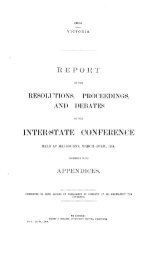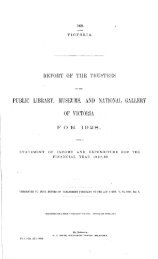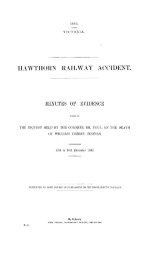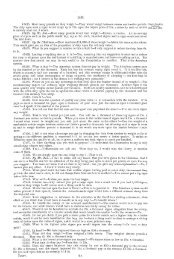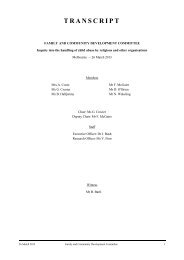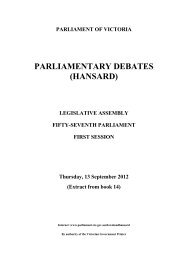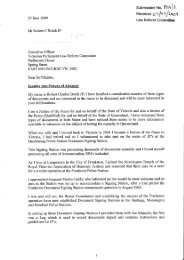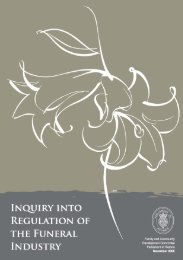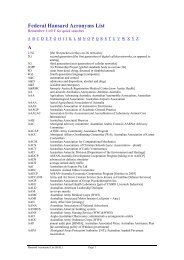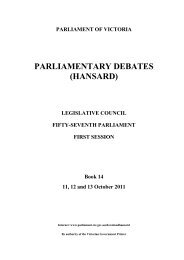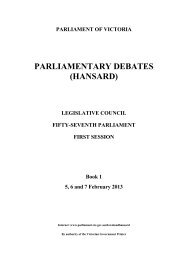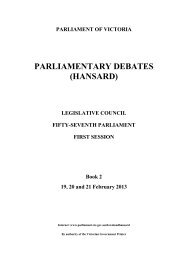Book 8 - Parliament of Victoria
Book 8 - Parliament of Victoria
Book 8 - Parliament of Victoria
You also want an ePaper? Increase the reach of your titles
YUMPU automatically turns print PDFs into web optimized ePapers that Google loves.
STATE TAXATION ACTS AMENDMENT BILL 2011<br />
Thursday, 2 June 2011 COUNCIL 1735<br />
To the extent that clause 31 introduces a defence to the<br />
relevant <strong>of</strong>fences it imposes a legal burden on an individual to<br />
satisfy the court that the person did not know that the<br />
information, statement or document was false or misleading,<br />
or that they did not omit information from an application or<br />
statement or fail to produce a document knowing that without<br />
that information or document their first home owner grant<br />
application was false or misleading. These defences may limit<br />
the right to be presumed innocent in section 25(1) <strong>of</strong> the<br />
charter act.<br />
On balance, however, the limitations upon this right are<br />
reasonable and justifiable in a democratic society for the<br />
purposes <strong>of</strong> section 7(2) <strong>of</strong> the charter act, having regard to<br />
the factors set out below.<br />
(a) What is the nature <strong>of</strong> the right being limited?<br />
The right to be presumed innocent enshrined in the charter act<br />
is a fundamental common-law principle that requires the<br />
prosecution to prove all elements <strong>of</strong> an <strong>of</strong>fence beyond<br />
reasonable doubt.<br />
However, the courts have recognised that this principle may<br />
be subject to limits particularly where, as here, the <strong>of</strong>fence is<br />
<strong>of</strong> a regulatory nature, and a defence is enacted for the benefit<br />
<strong>of</strong> a defendant in respect <strong>of</strong> what could otherwise be an<br />
absolute or strict liability <strong>of</strong>fence.<br />
(b) What is the importance <strong>of</strong> the purpose <strong>of</strong> the limitation?<br />
The purpose <strong>of</strong> this limitation is to provide an opportunity for<br />
an individual to escape liability, where they did not know that<br />
the information, statement or document given in or in<br />
connection with a first home owner grant application was<br />
false and misleading, or that omitting information or failing to<br />
produce a document would cause their application to be false<br />
and misleading. These are matters which are only within the<br />
knowledge <strong>of</strong> the defendant and therefore it is reasonable that<br />
they adduce or point to the evidence which puts this matter in<br />
issue for consideration by the court hearing the charge.<br />
Overall, this ensures an appropriate degree <strong>of</strong> culpability<br />
before an individual can be found guilty <strong>of</strong> the <strong>of</strong>fence.<br />
(c) What is the nature and extent <strong>of</strong> the limitation?<br />
The limitation is confined to the extent that it only reverses<br />
the onus in respect <strong>of</strong> the defence. The prosecution is still<br />
required to establish that the defendant provided, or omitted to<br />
provide, the relevant false or misleading information,<br />
statement or document, and where a defendant raises<br />
evidence <strong>of</strong> lack <strong>of</strong> knowledge, the prosecution will have the<br />
burden <strong>of</strong> disproving those matters beyond reasonable doubt.<br />
(d) What is the relationship between the limitation and its<br />
purpose?<br />
The imposition <strong>of</strong> a burden <strong>of</strong> pro<strong>of</strong> on the accused is directly<br />
related to its purpose. Unless a defendant can satisfy the court<br />
that he or she did not knowingly give information, make a<br />
statement, or produce a document that is false or misleading,<br />
or omit to give information or produce a document, without<br />
which the first home owner grant application is false or<br />
misleading, they will be convicted. This is information that is<br />
within the knowledge <strong>of</strong> the defendant, which would be<br />
difficult and onerous for the Crown to investigate and prove<br />
beyond reasonable doubt.<br />
(e) Are there any less restrictive means reasonably<br />
available to achieve its purpose?<br />
An evidential onus would be less restrictive upon the right to<br />
be presumed innocent, however, it would not be as effective<br />
because it could be too easily discharged by the accused,<br />
leaving the prosecution in the difficult position <strong>of</strong> having to<br />
prove what the accused did reasonably know. The inclusion<br />
<strong>of</strong> a defence with a burden on the accused to prove the<br />
matters on the balance <strong>of</strong> probabilities achieves an<br />
appropriate balance <strong>of</strong> all interests.<br />
Conclusion<br />
I consider that the bill is compatible with the charter act.<br />
The Hon. Gordon Rich-Phillips, MLC<br />
Assistant Treasurer<br />
Second reading<br />
Ordered that second-reading speech be<br />
incorporated into Hansard on motion <strong>of</strong><br />
Hon. G. K. RICH-PHILLIPS (Assistant Treasurer).<br />
Hon. G. K. RICH-PHILLIPS (Assistant<br />
Treasurer) — I move:<br />
That the bill be now read a second time.<br />
Incorporated speech as follows:<br />
During the 2010 election campaign this government promised<br />
to increase assistance for first home buyers and older<br />
<strong>Victoria</strong>ns, and provide a new stamp duty exemption for<br />
young farmers. This bill delivers on those election<br />
commitments, showing that this government is serious about<br />
easing the cost <strong>of</strong> living and providing a better quality <strong>of</strong> life<br />
for all <strong>Victoria</strong>ns, while helping <strong>Victoria</strong> reach its full<br />
economic potential.<br />
This government is committed to making housing more<br />
affordable in <strong>Victoria</strong> and ensuring that stamp duty is not an<br />
impediment to first home ownership. In line with this<br />
commitment, this bill enacts our election promise to cut stamp<br />
duty for eligible first home buyers by 50 per cent. The stamp<br />
duty cuts will be available for all first-time buyers purchasing<br />
a principal place <strong>of</strong> residence up to the value <strong>of</strong> $600 000 and<br />
will be phased in with a 20 per cent cut on 1 July 2011, with a<br />
further series <strong>of</strong> cuts commencing from 1 July 2013,<br />
1 January 2014 and 1 September 2014.<br />
In addition to this significant cut in stamp duty, this<br />
government will also maintain the existing first home bonus<br />
<strong>of</strong> $13 000 and first home regional bonus <strong>of</strong> $6500 for newly<br />
constructed homes. Under the previous government these<br />
measures were due to expire on 30 June 2011.<br />
These bonuses are in addition to the $7000 first home owner<br />
grant (FHOG), which means <strong>Victoria</strong>n first home buyers will<br />
continue to be eligible for $20 000 on the purchase <strong>of</strong> a new<br />
home in Melbourne and $26 500 for a new home purchased<br />
in regional <strong>Victoria</strong>. All <strong>Victoria</strong>n first home owners eligible<br />
to receive these payments will also benefit from the<br />
government’s stamp duty cuts, representing a significant<br />
boost for <strong>Victoria</strong>ns wanting to enter the housing market for<br />
the first time.



